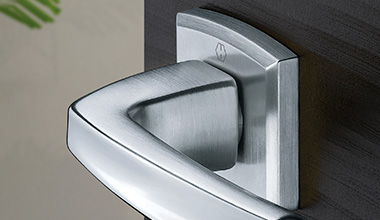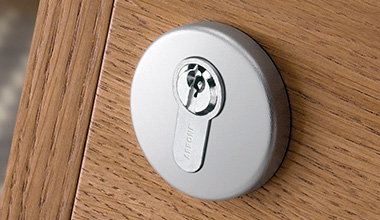HOPPE News
Improving the safety of non-insulated steel fire doors
Non-insulated steel fire doors: are your door closers compliant?
As ARRONE, a brand of the HOPPE Group, launches its new range of door closers for non-insulated steel fire doors, Jonathan Walker, product manager for ARRONE, explains the importance of specifying a door closer designed and manufactured specifically for this door type, and the implications of getting it wrong.
Market information provided by David Lycett, managing director of Robust Doors, suggests that 95% of steel fire doors supplied in the UK are non-insulated. Building regulations dictate whether the doors must be insulated or non-insulated, and this is dependent on the building’s intended use. Non-insulated steel doors can help to reduce the budget, but present other challenges that must be considered when specifying the accompanying hardware for fire door applications.
Impact on product specifications
In any mechanical door closer, the speed of closing, final latching and back check are controlled by the movement of oil between chambers. The flammable nature of any oil is, of course, always a concern with regard to fire door applications. However, the nature of non-insulated doors and the rate of heat transfer under fire conditions inevitably increases this concern (compared to timber or insulated steel fire doors). The fitting of a door closer that can cope with these very high temperatures is essential.
The intense levels of heat that the non-fire side of a non-insulated steel fire door can reach while containing a fire, leads to increased pressure within the door closer that could compromise its integrity and cause the oil to escape. If the oil comes into contact with the door, that is now extremely hot, it is likely to ignite. If the door closer is on the non-fire side when the oil combusts, it increases the risk of the fire spreading throughout the building.
This is why it is critical that only door closers tested with non-insulated steel fire doors are used in the final configuration.
Meeting performance and fire standards
With the majority of steel fire doors in the UK being non-insulated, it is vital that manufacturers, specifiers and installers are aware of these risks and ensure they are specifying compliant door closers.
Products that will be used on fire doors must have a CE mark to demonstrate compliance to the relevant standards. To achieve this, a product must demonstrate successful tests for both performance and fire. The manufacturer must also demonstrate compliance through its Factory Production Control (FPC) process. This covers the procedures put in place to allow a manufacturer to maintain consistent quality and keep records of processes or materials.

Solutions for non-insulated steel fire doors
Over the past three years, ARRONE have developed the AR5500SD and AR9500SD to offer door manufacturers a compliant door closing device solution for use on non-insulated steel fire doors. The products contain a non-flammable fluid with a chemical composition that provides consistent functional and fire performance.
The AR5500SD is a power size unit of 2-5, designed for use on steel doors up to a maximum door weight of 100kg and width of 1250mm. The AR9500SD is a power size 2-6 unit and intended for use on heavier door assemblies up to a maximum door weight of 120kg and width of 1400mm.
Both door closers have been included in successful fire tests on both sides of a non-insulated steel fire door and have achieved compliance in accordance with BS EN1634 Part 1. Both products are CE marked to the requirements of BS EN1154 in accordance with current legislation, making them suitable for use on non-insulated steel fire doors up to 240 minutes.
For more information on the ARRONE steel door closers, contact on [email protected] or 01902 484 400.




